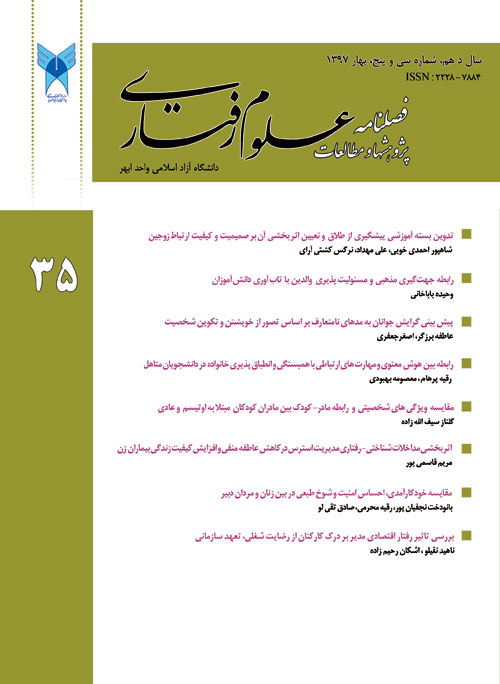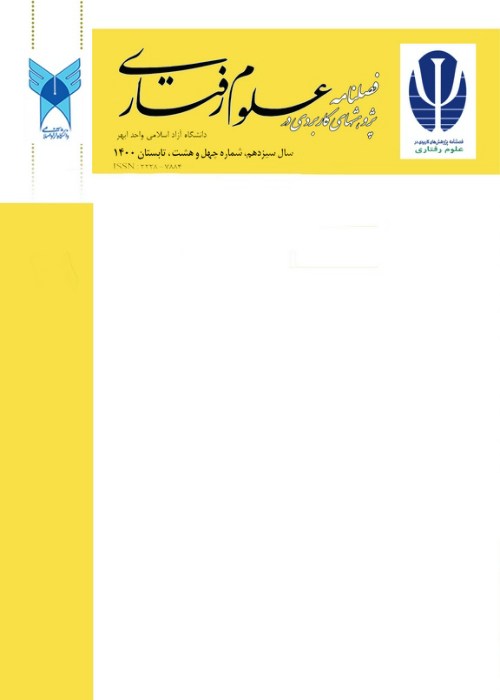فهرست مطالب

نشریه پژوهش های کاربردی در علوم رفتاری
پیاپی 35 (بهار 1397)
- 156 صفحه، بهای روی جلد: 80,000ريال
- تاریخ انتشار: 1398/04/04
- تعداد عناوین: 8
-
Pages 9-32The main purpose of this research was to study the effectiveness of Prevention of Divorce Training Package on couples' quality of communic - ation and intimacy. The method was quasi-experimental (pretest-posttest and control group) and the sample included 60 married males and females (experimental group- 30) (control group -30) persons of uremia education organization selected by convenience sampling method and assigned randomly in experimental and control groups. Dependent variables of the study were marital satisfaction and emotional divorce. Research instrum- ents were intimacy questionnaire of Van don –Brook and Stephan (1995) and quality of communication of Khoshkam (2006) questionnaires. Interve- ntion was conducted on experimental group but the control group received no intervention. After two months each groups followed again. The data were analyzed by using t-test and repeated measurement variance analyses in SPSS (V- 24). The results showed that training of the package could increase couples' intimacy and quality of communication in experimental group. However, there was no significant difference in the control group after the intervention (p>0/05). Based on research results on effectiveness of package, it was suggested for the Iranian family court, marriage and family counseling centers and family training centers to implement this package in their training program.Keywords: Prevention of Divorce Training Package, quality of communic -ation, intimacy
-
Pages 33-44This study aimed to determine the relationship of parents’ religious orientation and responsibility to high school students’ resiliency. The study was descriptive correlational. The population consisted of all male students in third grade and pre-university secondary schools in the academic year 95-96 enrolled in Khoramdeh city schools from among whom 258 students were selected random cluster method. Alport’s religious orientation question -naire, Nemati accountability and Connor and Davidson Scale questionnair -es were used as tools for research data gathering about each of the students; after collecting data, 247 students’ and their parents’ questionnaires were correlated using Pearson correlation and regression analysis. Findings showed that the religious orientation and resilience (P<0/01) as well as accountability and resiliency (P<0/01) had significant positive relationship. The findings showed that both variables religious orientation and respon -sibility cannot predict the students’ resilience.Keywords: Religious orientation, Accountability, Resiliency, Adolescents
-
Pages 45-62The purpose of present study was to determine the prediction of tenden -cy to unusual modes in youth based on self-concept and personality develop -ment in Tehran. The methodology was correlation. The population included youth (aged 20-30) in Tehran. 100 participants were selected by multiple cluster sampling and data were collected by questionnaires of self-concept, personality development and tendency to unusual modes and analyzed by statistical tests of Pearson correlation and multiple regression. Results indicated that self-concept and personality development can predict tende-ncy to unusual modes in youngers and self-concept explain more partially tendency to unusual modes (P<0/01). The results of research provide some evidence to suggest that self-concept and personality development effect tendency to unusual modes in youngers. Therefore, it was suggested for preventing tendency to unusual modes recover self-concept and personality development using psycho- educational packages.Keywords: self-concept. Personality development, modeling
-
Pages 63-86This study used correlational-descriptive research design employing all married students in Abhar IAU from among whom 210 cases were selected through random sampling. Data gathering tools were King’s self-assessed spiritual intelligence questionnaire (2008), Barton’s communicative skills questionnaire (1990) and Olson’s family adaptation scale (1985). Data were analyzed through multi-variate regression. Results indicated there was signifi - cant relationship among variables. This indicated that spiritual intelligence and communicative skills predicted adaptation and correlation of family.Keywords: spiritual Intelligence, communicative Skills, family adaptation, unity
-
Pages 87-106The Present research aimed to compare the comparison personality traits (neuroticism, extroversion, openness, agreeableness, conscientiousness) and mother- child relationship (acceptance, overprotection, over indulgence, rejec - tion) between mothers having autistic and normal children. 50 mothers with autistic children and 50 mothers of normal children in Tehran. Methodology was ex-post facto. Data were collected by questionnaires of NEO-FFI and MCRE AND analyzed through T-student test. The results showed that personality trait of neuroticism, relationship styles of rejection, over indulgence, overprotection in mothers with autistic children significantly were higher than mothers of normal children (P<0.01). Other personality traits and relationship style of acceptance significantly were less than mothers of normal children (P<0.01). The results provide some evidence that have an autistic child increase level of stress and anxiety in mothers, which gradually reduces the desired function of mothers and intensity personality trait of neuroticism and inefficient relationship styles in mothers. Therefore, it is suggested that functioning of mothers with autistic children in psycho educational packages for prevention and treatment should be considered.Keywords: Autism, mother- child relationship, Personality traits
-
Pages 107-122Psychological interventions can have important role in improving quality of life of patients suffering from Hypertension, because they improve physical, mental, and social situation of patients. This research goal is to investigate the effectiveness of group training of stress management with behavioral – cognitive approach on quality of life of patients suffering Hypertension. This research was done through experimental method with pre-test, post-test, and pursuit stages with witness group. The sample included 24 patients with Hypertension diagnosis who was chosen by a simple random way. A questionnaire about the life quality of patients suffering Hypertension was used for collecting data which was completed within pre-test, post-test, and pursuit by individuals. Behavioral- cognitive treatment of stress management was done during eight sessions on a test group and to this time while the frequent medical treatments continued in each of both group, the witness group were place in expectation list for psychology treatment. Data were analyzed using covariance analysis test. Mean score of quality of life in test group increased meaning fully as compared with the witness group (p < 0.05). The results suggested the effectiveness of group training of stress management with behavioral-cognitive approach on quality of life improvement of patients suffering from Hypertension.Keywords: Hypertension, quality of life, Behavioral- Cognitive, stress Management
-
Pages 123-138This study was carried out to compare self-efficiency, sense of safety and humor among male and female teachers in Tehran. In this study 200 teachers in Tehran were chosen using twomethodsFirst, 100 male teachers were selected from accessible community of selected schools; second, 100 female teachers were chosen by a purposeful sampling which was homogenized with the male samples. The questionnaires of Caprara and Esteka’s self-efficacy (2007), Aminpour and Zare’s sense of safety (1390) and Thorson and Powell’s humor scale (1997) were used in data collection process. Data were analyzed by means of Multivariate Analysis of Variance (MANOVA) tests and Independent-T test. There was significant differences in terms of perceived self-efficacy between male and female teachers (P =0.05). When comparing averages, men got a higher average in controlling negative emotions whereas women got a higher average in expressing positive emotions and perceived empathy. In social self-efficacy though, no significant difference was found. When comparing the two groups, there was also a significant difference in terms of sense of safety and humor (P = 0.05) and in both of the above mentioned variables, men got a better score. The results of this study show that female teachers experience lower positive emotions in educational environments than men.Keywords: self-efficacy, sense of safety, humor, men, women teacher
-
Pages 139-156The aim of the study was to investigate the effects of managerial economic behaviors on employees ‘perception of job satisfaction, organizational commitment, job performance, career commitment, role clarity and satisfaction with manager in “Private Insurance” sector in Zanjan. The statistical population consisted of employees of private insurance companies in Zanjan of which 119 individuals were selected by Random Sampling method to answer the research questionnaire. This survey-based research was functional and descriptive of experimental type. The general Cronbach Alpha of the questionnaire was 0.784 and the obtained results indicated its reliability and face validity too. Also for measuring the managerial economic behavior the standard questionnaires in five point Likert scale were used. In order to investigate the relationship among variables, correlation coefficient and regression test methods were used. The results revealed that managerial economic behavior had a meaningful effect on job satisfaction, organizational commitment, job performance, career commitment, role clarity and satisfaction with manager. Also role clarity had a significant and positive effect on career commitment, organiz-ational commitment and job performance. Finally, the meaningful effect of job satisfaction on career commitment as well as job performance in private insurance companies in Zanjan was confirmed.Keywords: job performance, job satisfaction, managerial economic behave-ior, organizational commitment, private insurance sector


